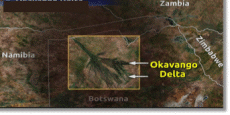Human-Induced Climate Change Reduces Chance of Flooding in Okavango Delta
Why it Matters: The Okavango basin in southern central Africa experienced severe floods in 2009–2011, with considerable economic and societal impacts: villages and houses flooded, bridges closed or washed away, and water and electricity supply interrupted. The question arose: to what extent were these floods caused by climate change driven by greenhouse gas emissions, with the implication that events of similar or higher magnitude might be expected to occur (more frequently) in the future? This study represents the first-ever attempt to answer this question for a region in Africa using a ‘‘risk-based’’ approach that examines how the probability of exceeding a threshold has been altered due to emissions.
Key Challenges: The study was carried by using simulations from two models of the climate system. In one set of simulations, the models were driven with “real-world” conditions observed over the 2009-2011 period, including observed concentrations of greenhouse gases. In other simulations, the models were driven with “non-greenhouse-gas” conditions that might have been in a world in which human emissions of greenhouse gases had never occurred. These climate model simulations were then used to run a model of the Okavango River system to predict how floods would change under these different climate conditions.
Accomplishments: Results from this groundbreaking study suggest that greenhouse gas-caused climate change substantially reduced chances of flooding in the Okavango River Basin, an ecologically/geographically unique region in southern Africa. The counterintuitive result is because with warmer air, the river takes longer to flow to the delta with more evaporation and less flooding. The huge flooding observed recently in this area would apparently have been much worse without a warmer climate.
Investigators: work carried out as part of NERSC project, "Attribution of extreme weather risk to anthropogenic emissions," Daithi Stone (LBNL), Principal Investigator.
More Information: Piotr Wolski, Dáithí Stone, Mark Tadross, Michael Wehner, and Bruce Hewitson, "Attribution of floods in the Okavango basin, Southern Africa," Journal of Hydrology 511 (2014) 350–358. NERSC News: http://www.nersc.gov/news-publications/news/science-news/2014/human-induced-climate-change-reduces-chance-of-flooding-in-okavango-delta/








